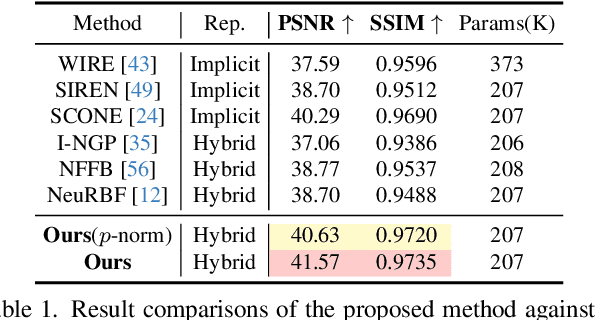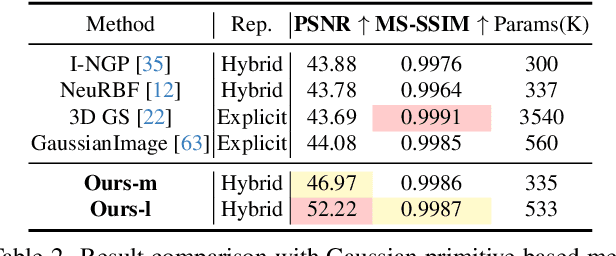Chong Lv
MetricGrids: Arbitrary Nonlinear Approximation with Elementary Metric Grids based Implicit Neural Representation
Mar 13, 2025



Abstract:This paper presents MetricGrids, a novel grid-based neural representation that combines elementary metric grids in various metric spaces to approximate complex nonlinear signals. While grid-based representations are widely adopted for their efficiency and scalability, the existing feature grids with linear indexing for continuous-space points can only provide degenerate linear latent space representations, and such representations cannot be adequately compensated to represent complex nonlinear signals by the following compact decoder. To address this problem while keeping the simplicity of a regular grid structure, our approach builds upon the standard grid-based paradigm by constructing multiple elementary metric grids as high-order terms to approximate complex nonlinearities, following the Taylor expansion principle. Furthermore, we enhance model compactness with hash encoding based on different sparsities of the grids to prevent detrimental hash collisions, and a high-order extrapolation decoder to reduce explicit grid storage requirements. experimental results on both 2D and 3D reconstructions demonstrate the superior fitting and rendering accuracy of the proposed method across diverse signal types, validating its robustness and generalizability. Code is available at https://github.com/wangshu31/MetricGrids}{https://github.com/wangshu31/MetricGrids.
Approximately Invertible Neural Network for Learned Image Compression
Aug 30, 2024



Abstract:Learned image compression have attracted considerable interests in recent years. It typically comprises an analysis transform, a synthesis transform, quantization and an entropy coding model. The analysis transform and synthesis transform are used to encode an image to latent feature and decode the quantized feature to reconstruct the image, and can be regarded as coupled transforms. However, the analysis transform and synthesis transform are designed independently in the existing methods, making them unreliable in high-quality image compression. Inspired by the invertible neural networks in generative modeling, invertible modules are used to construct the coupled analysis and synthesis transforms. Considering the noise introduced in the feature quantization invalidates the invertible process, this paper proposes an Approximately Invertible Neural Network (A-INN) framework for learned image compression. It formulates the rate-distortion optimization in lossy image compression when using INN with quantization, which differentiates from using INN for generative modelling. Generally speaking, A-INN can be used as the theoretical foundation for any INN based lossy compression method. Based on this formulation, A-INN with a progressive denoising module (PDM) is developed to effectively reduce the quantization noise in the decoding. Moreover, a Cascaded Feature Recovery Module (CFRM) is designed to learn high-dimensional feature recovery from low-dimensional ones to further reduce the noise in feature channel compression. In addition, a Frequency-enhanced Decomposition and Synthesis Module (FDSM) is developed by explicitly enhancing the high-frequency components in an image to address the loss of high-frequency information inherent in neural network based image compression. Extensive experiments demonstrate that the proposed A-INN outperforms the existing learned image compression methods.
 Add to Chrome
Add to Chrome Add to Firefox
Add to Firefox Add to Edge
Add to Edge